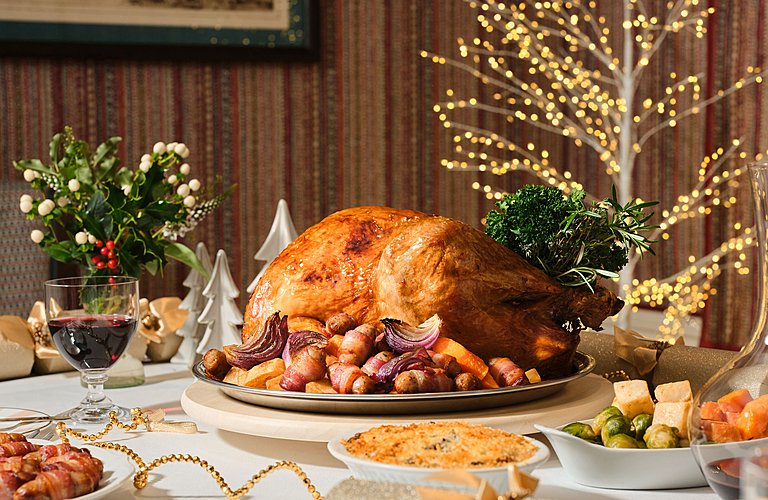192 Sloane Street, London SW1X 9QX

A Guide to Creating a Dementia-Friendly Christmas Feast
Festive season is a fantastic opportunity to bring friends and family together. If you have a loved one living with dementia, small adjustments to your Christmas table can significantly enhance their experience. Our Executive Chef, Tristan Welch, and BANT registered nutritionist, Eva Humphries, offer invaluable insights on tailoring the traditional Christmas feast at home to better cater to individuals living with dementia. Their advice covers a range of considerations, from the choice of ingredients to table arrangements, creating an overall dementia-friendly atmosphere.
Nutritional considerations:
People living with dementia may benefit from including additional protein, Omega-3 fats, and select vitamins and minerals in their diet. Traditional Christmas dinners have a lot to offer nutritionally. Commence the meal with Omega-3-rich oily fish such as smoked mackerel, trout, or wild salmon. Essential proteins can be obtained from main courses like turkey, chicken, roast beef, venison, duck, or goose. Additionally, homemade gravy crafted from roasted onions and bones can be a nutritional powerhouse, supporting bone health and offering antioxidants.
Changes in taste perception:
As we get older, our taste buds decrease. This results in the food tasting blander, meaning we might crave more salt and seasonings. Additionally, our love for carbs tends to grow as our bodies see them as fast energy sources. Within dementia, the desire for sugary or carb-heavy snacks might increase, leading to fewer proper meals and more snacking. Unfortunately, snacks often lack nutrients. Therefore, having smaller, balanced meals more frequently could be a healthier alternative.
Healthful tips for your traditional Christmas roast:
Traditional Christmas roasts cover a lot of nutritional needs, but it's important to keep a few things in mind. Elderly relatives might eat less overall but require more nutrients. Prioritise nutrient-rich selections like turkey, homemade gravy, and vegetables on their plate to ensure a well-rounded meal. When it comes to roast potatoes, it's important to find a balance. While being filling, they offer fewer nutrients. Given increased carb cravings, limit potatoes to about a quarter of the plate to encourage a more varied meal. It's also important to be mindful of the cooking fats you use, as some oils like sunflower or vegetable oil can burn easily when roasted at high temperatures. For better health, consider using fats like goose or beef, which have higher smoking points and are better suited for roasting at higher temperatures.
Choice of vegetables:
Consider choosing familiar vegetables you would typically serve for Christmas to evoke joyful holiday memories. Brussels sprouts should be cooked a bit longer than usual. Considering that dementia can impact chewing and swallowing abilities, prioritize textures that are easier to manage. Avoid overcooking vegetables, they're just right if they can be easily squashed with a fork. Instead of a whole turkey drumstick, opt for thinly sliced portions that are easier to chew.
Table setting and serving:
When setting the Christmas table, give preference to bold and simple colours and centrepieces. Minimize clutter and excess cutlery, as these can confuse or worry a person living with dementia. Consider offering fresh cutlery for each course and changing the plate colour as bold hues can make the food stand out. When serving a Christmas meal to someone living with dementia, remember to go slow and steady. Offer the meal in small portions, with just three or four items on the plate at a time. Overloading the plate can overwhelm the individual. With the potential chaos of the season, sticking to a structured timetable can help create a more organized and enjoyable dining experience for those living with dementia.
Rekindling memories through traditions:
Christmas is a wonderful time to reminisce, especially through food. Take a moment to revisit recipes from years past, that might bring back nostalgic memories. Happy moments that engage the mind matter just as much as nutrition. Consider adding a thoughtful touch to enhance the Christmas dining experience for a relative with dementia by playing their favourite album or song before or after dinner. Music has a powerful way of evoking emotions and memories, contributing to a comforting and familiar atmosphere during this special time.
Managing food intake for those who forget they have eaten:
People living with dementia may forget they have eaten and tend to have smaller, frequent meals. This presents an opportunity to replenish essential nutrients through food intake. Using smaller plates can prevent overeating and ensure a well-balanced meal.
At the heart of any Christmas meal is the joy of being with family and friends. Your cherished traditions go beyond the delightful array of festive dishes. The shared moments of joy, laughter, and warmth that come from being in the company of loved ones create a truly special atmosphere that creates a joyful experience for people living with dementia.

